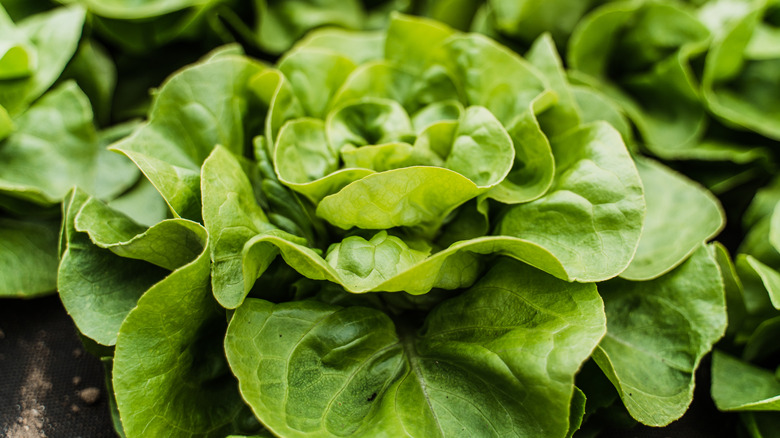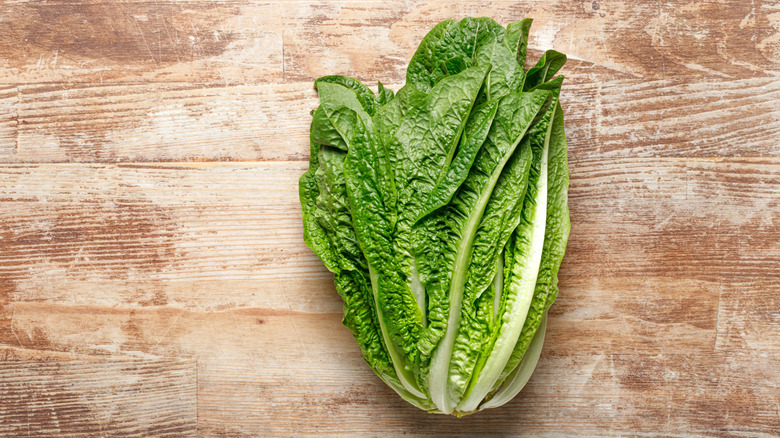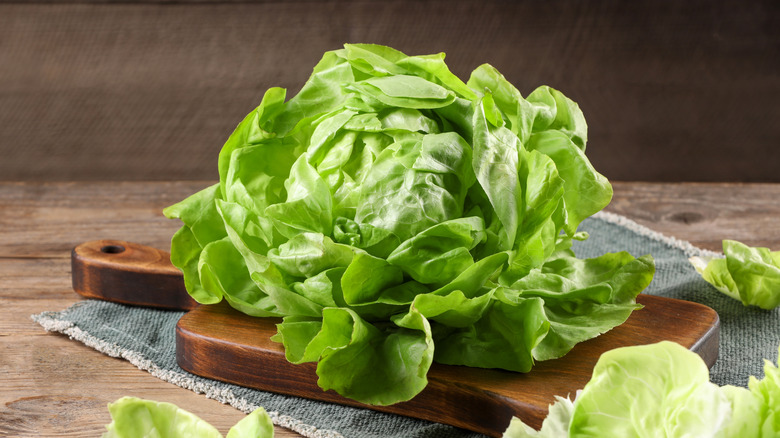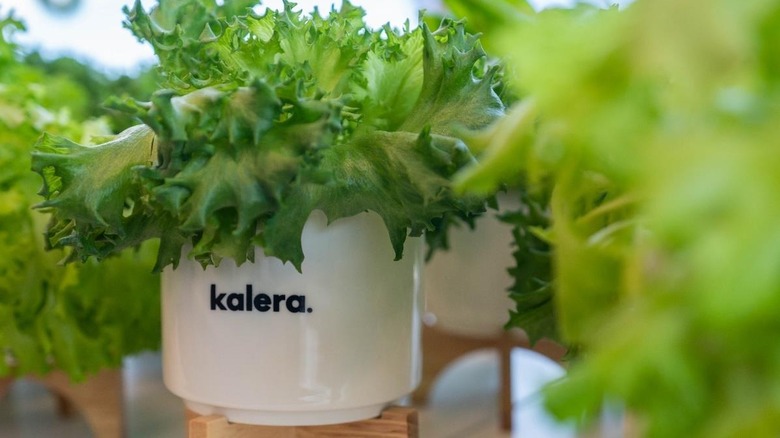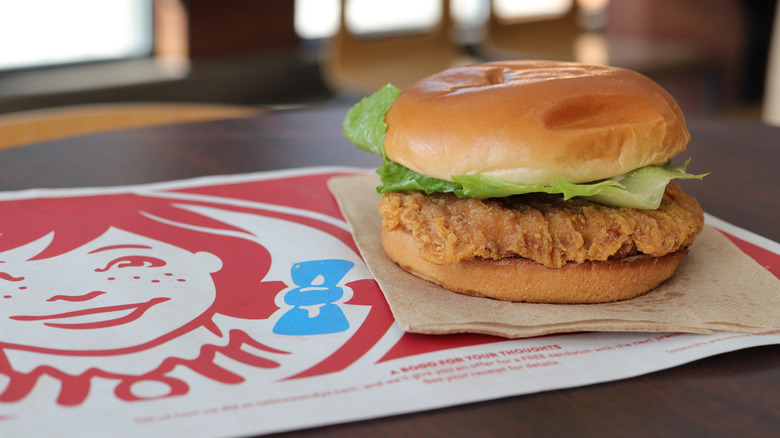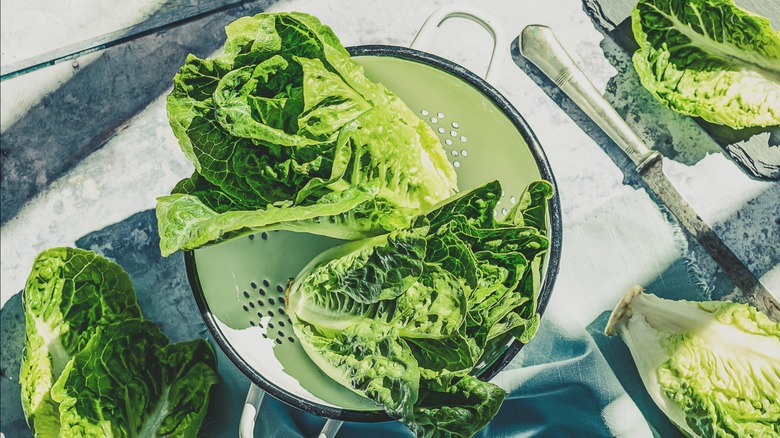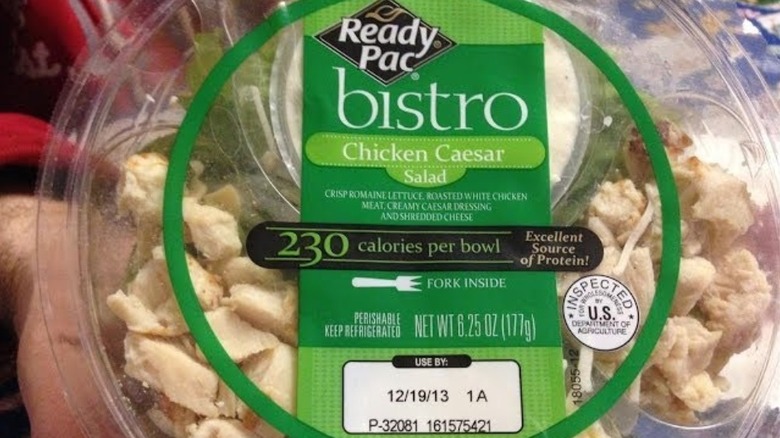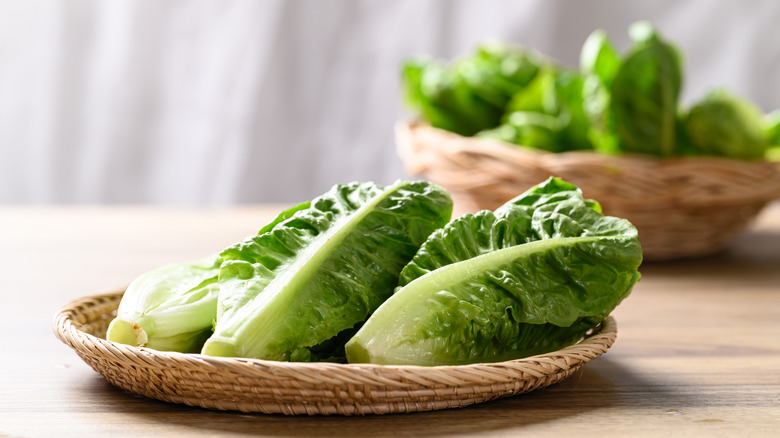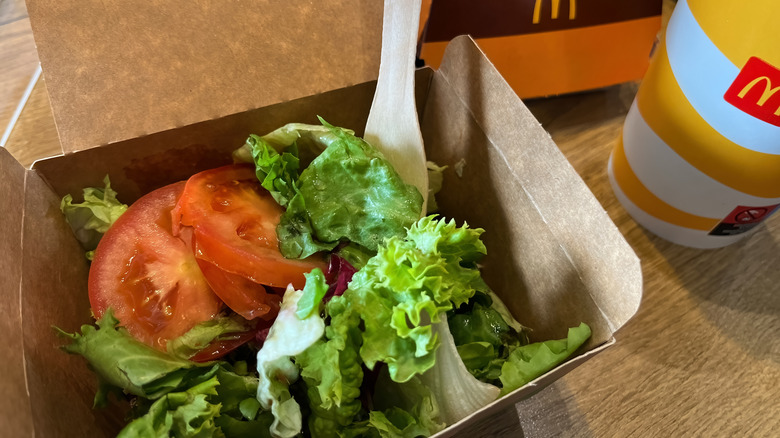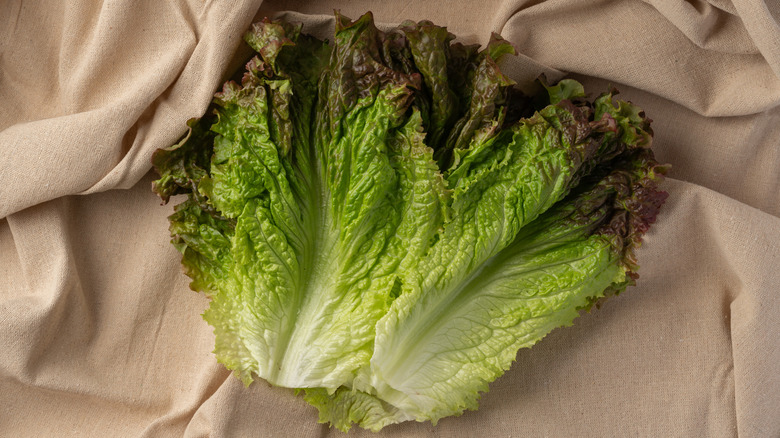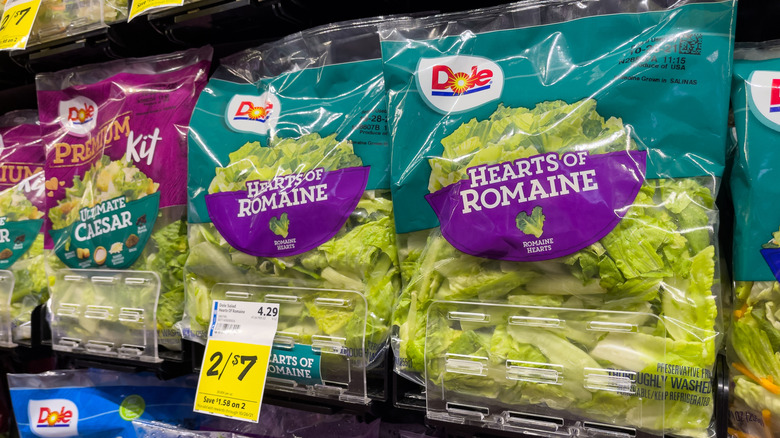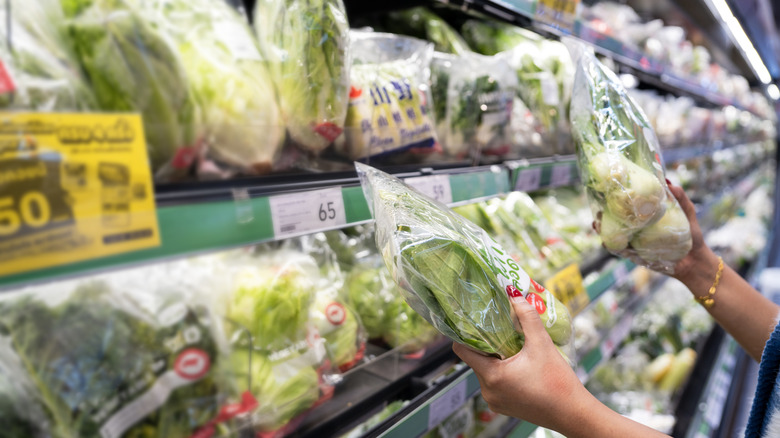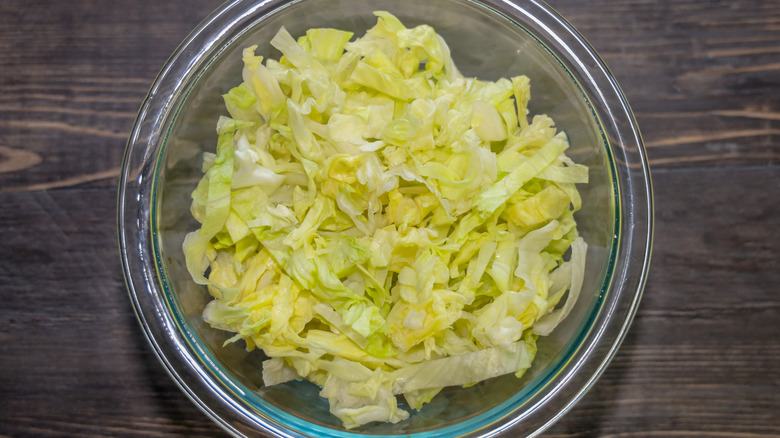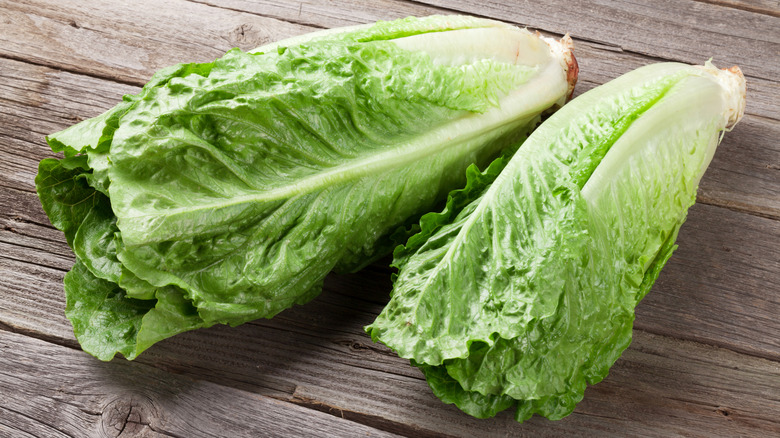The Biggest Lettuce Recalls In US History
Most of us think of lettuce as a healthy diet choice. It is, after all, a good source of nutrients and even hydration (raw lettuce is around 95% water). Romaine lettuce, for example, contains vitamin C, calcium, vitamin K, and folate, while the nutritional value of iceberg lettuce can offer vitamin A and vitamin K. For these reasons (and the juicy, crunchy texture it gives tacos, salads, and sandwiches), lettuce is a staple in U.S. households. In fact, research suggests that around 25% of Americans enjoy iceberg lettuce in their salad.
But lettuce, sadly, is not perfect. This leafy green is vulnerable to contamination from many harmful strains of bacteria, including E. coli, listeria, salmonella, and even a parasite called Cyclospora cayetanensis. Often, this bacteria gets into the leafy green due to contaminated water sources or wild animal poop (yep, seriously — more on that below).
If you're concerned about the safety of your favorite salad, recalls are there to keep you safe. Over the years, a number of companies, retailers, and even fast-food chains have had to pull lettuce from the shelves and kitchens in a bid to stop harmful foodborne illnesses from spreading and making people sick. Keep reading to learn about some of the biggest lettuce recalls in history.
11,500 pounds of lettuce recalled in four states due to deer poop (2023)
If we could list off the things we absolutely do not want to find in our salad, poop would probably be number one. But unfortunately, that's what happened in July 2023 to customers of G.O. Corporation. The Minneapolis-based company recalled around 11,500 pounds of lettuce and salad mixes from four states (Iowa, Minnesota, North Dakota, and Wisconsin) because they contained romaine lettuce that may have been contaminated with deer poop.
Animal feces gets into lettuce quite easily — of course, lettuce is grown in soil outside, which is exactly where animals, such as deer and cattle, do their business. But poop in your salad is not just, quite frankly, gross, it is also dangerous. Feces can harbor harmful bacteria like E. coli, which, if consumed, can cause symptoms like diarrhea, fever, and stomach pain. Usually, E. coli doesn't cause serious illnesses, but in rare cases, it can lead to life-threatening complications. In a bid to protect consumers from getting sick, anyone who had already purchased any of the salads with the contaminated lettuce was urged to dispose of them instead of consuming them.
Revolution Farms recalled lettuce-based salads from stores in six states due to Listeria concerns (2023)
E. coli isn't the only strain of bacteria that can lurk in your salad. Also in 2023, Revolution Farms recalled lettuces and salad mixes, including whole leaf romaine, mini romaine, kale caesar, and buttery bibb, from multiple grocery stores across six states (Michigan, Indiana, Illinois, Ohio, Kentucky, and Wisconsin) due to fears they contained lettuce that had been contaminated with listeria. Like E. coli, if consumed, listeria can lead to unpleasant symptoms, including fever, nausea, vomiting, and diarrhea. Again, it can be life-threatening. In fact, research suggests that around 260 people in the U.S. die from listeria every year.
At the time of the Revolution Farms recall, the affected salad products had already been sent to several retailers and food distributors, including SpartanNash, Fresh Thyme Market, and Meijer. The latter has more than 260 stores in the six states implicated in the recall. Unfortunately, in this case, the contaminated lettuce was linked with an outbreak of illnesses associated with the disease-causing bacteria. Retailers were told to clear their shelves of any of the recalled products, while consumers who had already bought the products were urged to dispose of them.
Kalera recalls more than 630 cases of lettuce in Florida due to salmonella concerns (2022)
If you thought listeria and E. coli were bad enough, another strain of bacteria has entered the chat: salmonella. If consumed, this bacteria can lead to an illness called salmonellosis, which, once again, comes with unpleasant digestive symptoms like diarrhea, stomach cramps, and vomiting. In serious cases, it can infect the blood and even increase the risk of chronic diseases, such as reactive arthritis. This is why, in 2022, vertical farming brand Kalera recalled more than 630 cases of butter, romaine, and its signature Krunch lettuce varieties. At the time, the greens had already been sent to stores and foodservice companies in Florida before food safety testing revealed that Salmonella might be present.
Fortunately, there were no reports of salmonellosis associated with the recalled products. In an abundance of caution, and to protect consumers from getting sick, anyone who had already bought the leafy greens was urged not to consume them and, instead, throw them away and request a refund.
Wendy's recalled romaine lettuce from restaurants across the U.S. amid an E. coli outbreak (2022)
The fast food industry has been plagued by many recalls in the past. In 2015, for instance, Subway recalled 34,000 pounds of cooked chicken due to fears they contained plastic. And in 2019, Taco Bell had to recall around 2.3 million pounds of its seasoned beef over concerns related to the presence of metal shavings. In 2022, it was Wendy's turn. This time, it wasn't because of foreign objects like metal or plastic, but because of an E. coli outbreak.
During an investigation into the outbreak, which saw over 100 confirmed illnesses and more than 50 people hospitalized, the Centers for Disease Control and Prevention (CDC) discovered that more than 80% of people reporting E. coli symptoms had previously eaten at a Wendy's restaurant. Each had eaten different menu items with similar ingredients, so it was difficult to pin down the exact source of the bacteria. However, nearly 70% did say they had eaten a menu item that contained romaine lettuce. This led Wendy's to remove the leafy green from the menu in all of the restaurants where the sick people had previously dined.
Dole Fresh Vegetables recalled packaged salads from 20+ states due to fears over listeria-contaminated lettuce and other leafy greens (2021)
In 2021, Dole Fresh Vegetables, which is owned by Dole plc (the world's leading fresh produce provider), was forced to pull a range of leafy greens, including lettuce, from the shelves across more than 20 states due to listeria concerns. The decision was made after a bag of shredded iceberg lettuce produced in its Yuma, Arizona facility and a bag of mixed lettuce produced in its Bessemer City, North Carolina facility both tested positive for the bacteria.
In addition to the recall, both facilities were temporarily closed while cleaning took place to get rid of the listeria. The decontamination process is easier said than done — listeria is incredibly resilient and can withstand many cleaning products, as well as cold temperatures. Heat treatment is one of the best ways to get rid of the bacteria, but it will also respond to a few different cleaning chemicals, too, including bleach.
The particular strain of bacteria found in both facilities was a match for a type of listeria that had already caused 16 illnesses since 2014. With that in mind, anyone who had already purchased the lettuce from Dole was urged to dispose of it immediately to avoid contracting foodborne illness.
Tanimura & Antle recalled more than 3,300 cartons of romaine lettuce due to E. coli fears (2020)
Californian company Tanimura & Antle specializes in a variety of fresh produce, including cauliflower, broccoli, and several different types of lettuce. But in 2020, it ran into difficulties with its romaine variety after random testing revealed it might be contaminated with E. coli. One way that this harmful bacteria can get into lettuce is through wild animals defecating on the soil where it's grown. But it can also come from nearby farm animals, too, or even birds flying above the farms and pooping onto the crops.
As a result of the E. coli test result, Tanimura & Antle had to recall more than 3,300 cartons of romaine lettuce that had already been shipped out to around 20 states. Fortunately, there were no reports of illness associated with the bacteria. To protect consumers, anyone who had bought the romaine lettuce was urged to dispose of it immediately.
More than 75,000 pounds of salad recalled due to E. coli-contaminated lettuce concerns (2019)
There are a few key ingredients in a caesar salad — croutons, parmesan, creamy dressing, a protein source, and romaine lettuce. But one thing you absolutely don't want in your lunchtime favorite is E. coli. Unfortunately, that was the case for some people who bought Ready Pac's Bistro Chicken Caesar Salad in 2019. It turns out that some of the lettuce used in the salad might have been contaminated with E. coli, which resulted in Ready Pac salad producer Missa Bay issuing a recall of more than 75,000 pounds of the product.
At the time of the recall, the salad had already been distributed to 22 states. And, unfortunately, in this particular situation, people had already started to get sick from consuming it. In fact, the E. coli was found in the Ready Pac salad during an investigation into the outbreak.
Fresh Foods Manufacturing recalled more than 8,700 pounds of salad to avoid an E. coli outbreak (2018)
Once again, in 2018, multiple salad products, including caesar salad, garden salad, and chef salad, were recalled by Fresh Foods Manufacturing due to fears they contained E. coli. In total, more than 8,700 pounds of salad were recalled from retailers in Indiana, Ohio, Pennsylvania, and West Virginia. As with many recalls on this list, the leafy green responsible was romaine lettuce. This is likely because romaine lettuce is often grown in fields near livestock farms, where animals may host the bacteria in their guts (and, subsequently, of course, their feces).
Fortunately, in this particular case, there were no reports of foodborne illness associated with the recalled romaine lettuce. However, the Food and Safety Inspection Service urged anyone who was concerned about experiencing illness as a result of consuming the lettuce to contact their healthcare provider.
McDonald's recalled salads from more than 3,000 restaurants due to potential Cyclospora contamination (2018)
Like most other fast food chains, McDonald's is not immune from recalls. In fact, the fast food giant has had to issue quite a few over the years due to issues like plastic in the chicken nuggets and potential listeria in the apple slices. In 2018, McDonald's also had to stop serving salads from 3,000 restaurants in 14 states due to concerns over foodborne illness. This time, it wasn't E. coli, listeria, or salmonella, but Cyclospora cayetanensis, a type of parasite. If consumed, C. cayetanensis may lead to an intestinal illness called cyclosporiasis, which can cause frequent and explosive watery diarrhea.
As with most foodborne illnesses, cyclosporiasis is more dangerous for people with weakened immune systems. Amid the 2018 outbreak, more than 280 people reported sickness across 15 states, and around 11 people were hospitalized. Once again, just like with E. coli, Cyclospora cayetanensis is usually spread by infected poop. In this case, however, it's not animals that spread the parasite but humans. It isn't usually spread from one person to another directly; however, it can spread to food sources through infected water.
Adam Bros Farming recalled lettuce from seven states due to E. coli fears (2018)
In 2018, E. coli struck again. This time, however, it wasn't romaine lettuce that was affected, but green leaf lettuce and red leaf lettuce, alongside cauliflower. Adam Bros Farming issued a recall for its lettuce from a total of seven states, as well as Canada and Tijuana in Mexico, after testing of a reservoir near the crop fields revealed E. coli was present in the water. Fortunately, none of the vegetables actually tested positive for the bacteria, but in an abundance of caution, they were pulled from the shelves anyway. There were no illnesses reported, either.
The recall made sense, as even though the likelihood was low for foodborne illness in this particular case, the consequences of sending out contaminated food can be catastrophic. Every year, foodborne illnesses, including E. coli, contribute to 128,000 hospitalizations and 3,000 deaths in the U.S.
Dole Fresh Vegetables recalled more than 2,500 cases of bagged romaine lettuce salad due to Listeria fears (2012)
The 2021 recall wasn't the first time Dole Fresh Vegetables found itself in hot water over listeria bacteria contamination. In 2012, nearly a decade earlier, the company had to recall more than 2,500 cases of bagged romaine salads due to concerns over the illness-causing bacteria. At the time of the recall, the salad had already been sent to nine states: Virginia, Alabama, Florida, Georgia, Maryland, North Carolina, Pennsylvania, South Carolina, and Tennessee.
Fortunately, no one who had already eaten the salad reported any symptoms of illness. However, anyone who still had the produce in their fridge was urged to dispose of it, as contracting listeria can be life-threatening. It is particularly dangerous for pregnant people. In fact, it increases the risk of stillbirth, miscarriage, premature labor, and dangerous infections in newborns, such as meningitis.
Dole Fresh Vegetables recalled lettuce salads across 15 states due to risk of salmonella contamination (2012)
In the same year as the Listeria recall, Dole Fresh Vegetables had to issue yet another recall. But this time, though, it was because of a different type of foodborne bacteria: salmonella. More than 750 cases of the brand's Seven Lettuces salad had to be recalled across 15 states after testing in New York found traces of the bacteria. Fortunately, once again, there were no reported illnesses associated with the recalled products.
That said, the recall was a wise decision, given that salmonella is one of the most common strains of foodborne bacteria in the U.S. Research suggests that it is responsible for around 1.35 million infections every year. Most occur due to eating contaminated foods, like the lettuce from Dole Fresh Vegetables or (more often than not) chicken products. However, it's also possible to contract the harmful bacteria from drinking contaminated water or handling infected animals.
River Ranch Fresh Foods recalled more than 2,100 cases of bagged salad due to Listeria concerns (2011)
As evidenced by this list, listeria has been the cause of many, many recalls in the U.S. In 2011, another company that fell foul to the bacteria was River Ranch Fresh Foods, which used to be based in California, but has since shut down operations. At the time, River Ranch had to recall more than 2,100 cases of bagged salad, including shredded iceberg lettuce and romaine lettuce, after tests in Ohio revealed Listeria. Luckily, in this case, nobody reported any illness or unpleasant symptoms as a result of consuming the recalled products.
Pittsburgh grocery store chain Giant Eagle was one of the companies impacted in the River Ranch Fresh Foods recall. At the time, it had been selling bags of the company's iceberg lettuce, but also using it to make some of its fresh sandwiches sold on the deli counter.
Freshway Foods recalled 1,000 cartons of romaine lettuce amid E. coli outbreak in 23 states (2010)
In 2010, Freshway Foods also had to recall romaine lettuce due to E. coli contamination fears. The company recalled around 1,000 cartons of the leafy green vegetable from restaurants and other foodservice locations. It was predicted that, at the time of the recall, around 23,000 pounds of potentially contaminated lettuce had been sold to restaurants and other foodservice locations in 24 states, as well as salad bars in grocery stores like Kroger and (once again) Giant Eagle. Anyone who still had the salad in their possession after purchasing it from a grocery store was urged not to consume it.
Unfortunately, in this case, the contaminated lettuce was associated with foodborne illnesses across 23 states. Out of everyone affected, around 12 people had to receive hospital treatment. Three of those people developed hemolytic uremic syndrome, which is a potentially life-threatening condition that leads to blood vessel damage and inflammation. In very serious cases, it can lead to kidney failure, strokes, blood clots, and even comas.
